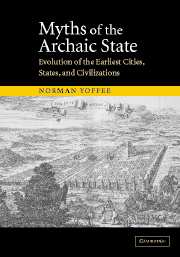Book contents
- Frontmatter
- Contents
- List of figures
- List of tables
- INTRODUCTION
- 1 THE EVOLUTION OF A FACTOID
- 2 DIMENSIONS OF POWER IN THE EARLIEST STATES
- 3 THE MEANING OF CITIES IN THE EARLIEST STATES AND CIVILIZATIONS
- 4 WHEN COMPLEXITY WAS SIMPLIFIED
- 5 IDENTITY AND AGENCY IN EARLY STATES: CASE STUDIES
- 6 THE COLLAPSE OF ANCIENT STATES AND CIVILIZATIONS
- 7 SOCIAL EVOLUTIONARY TRAJECTORIES
- 8 NEW RULES OF THE GAME
- 9 ALTERED STATES: THE EVOLUTION OF HISTORY
- Acknowledgments
- References
- Index
9 - ALTERED STATES: THE EVOLUTION OF HISTORY
Published online by Cambridge University Press: 22 September 2009
- Frontmatter
- Contents
- List of figures
- List of tables
- INTRODUCTION
- 1 THE EVOLUTION OF A FACTOID
- 2 DIMENSIONS OF POWER IN THE EARLIEST STATES
- 3 THE MEANING OF CITIES IN THE EARLIEST STATES AND CIVILIZATIONS
- 4 WHEN COMPLEXITY WAS SIMPLIFIED
- 5 IDENTITY AND AGENCY IN EARLY STATES: CASE STUDIES
- 6 THE COLLAPSE OF ANCIENT STATES AND CIVILIZATIONS
- 7 SOCIAL EVOLUTIONARY TRAJECTORIES
- 8 NEW RULES OF THE GAME
- 9 ALTERED STATES: THE EVOLUTION OF HISTORY
- Acknowledgments
- References
- Index
Summary
What is called collective memory is not a remembering but a stipulating; that this is important, and this is the story about how it happened, with the pictures that lock the story in our minds. Ideologies create substantiating archives of images, representative images, which encapsulate common ideas of significance and trigger predictable thoughts, feelings.
susan sontag (2003:86)I began this book by delineating the myths that archaeologists created about “the archaic state”: the earliest states were very similar to one another (and so represent the evolution of “the archaic state”); they were large, territorial creatures, evolved from “chiefdoms” and from earlier stages that could be known through ethnographic analogies; they were dominated by ineffably and irresistibly powerful rulers, who controlled, or even monopolized, all means of production and the distribution of goods and services, and monitored the flow of information in them, and instituted true law.
These myths of the earliest states and their evolution are products of archaeological theory, the attempt to understand a process whose outcome is observed but whose dynamics and details are imperfectly known from the observation. Although it is hardly necessary to repeat the social science mantra that “all observation is theory-laden,” it is surprising that the myths created by leading archaeological theoreticians have had such little influence on how research was conducted and data analyzed.
- Type
- Chapter
- Information
- Myths of the Archaic StateEvolution of the Earliest Cities, States, and Civilizations, pp. 196 - 232Publisher: Cambridge University PressPrint publication year: 2005



